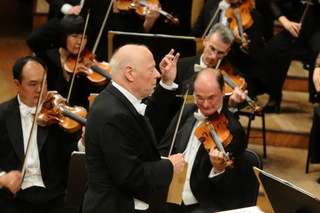|
Back
Haitink at 80 Lucerne
Kultur Kongresszentrum Luzern
09/14/2009 -
Joseph Haydn: Symphony No. 101 (“The Clock”)
Anton Bruckner: Symphony No. 7
Chicago Symphony Orchestra, Bernard Haitink (conductor) 
B. Haitink (© Peter Fischli/Lucerne Festival)
Some works should stand alone and not be preceded by other works. Bruckner’s mighty Seventh Symphony is probably one of them but invariably it is prefaced in most concert programmes by some Haydn or Mozart. Is it to allow latecomers to arrive? Is it to bolster bar takings in the interval? Is it to boost ticket sales? Is it to allow music-lovers to mingle and talk in the interval? Whatever the true answer (and it is probably a combination of all these factors), musically the substantial main course inevitably dwarfs and drowns the hors d’oeuvre, however tasty.
And so it was with Haydn’s Symphony No. 101 (“The Clock”) which was tidily played but one had the sense that orchestra, conductor and audience were waiting for the second half. The performance lacked the fizz and wit that a period orchestra under, say, Norrington or Harnoncourt would certainly imbue on the work. String players found it hard to resist vibrato, though the timpanist (why do so many American timpanists stand to play?) made good use of his unusual timpani sticks which resembled rockets. It was all rather dull and lifeless.
No such qualms in the Bruckner. This turned out to be a magnificent and memorable performance. Of course Haitink knows Bruckner and this score like the back of his hand, he holds a Medal of Honour from the Bruckner Society; yet one is surprised that he chooses to have a score and follow it religiously. The quality of the performance was clear as soon as the reverential strings began their serene opening melody of the Allegro moderato. Haitink, who has been Principal Conductor of the Chicago since 2006, drew out a honey-toned lustre from the strings far removed from the hard-edged Solti era; one closed one’s eyes and heard the Concertgebouw. The steadiness that dulled the Haydn was a positive virtue in the Bruckner, with its even tempi, its regular bass pulse, the massive blocks which characterise so many of Bruckner’s symphonies. Particular mention must be made of the sonorous brass throughout and the orchestra’s flautist, a joy to hear on every entry.
The Adagio built up majestically to its C major climax, followed by the pages dedicated to Wagner who died whilst Bruckner was writing this movement. Wagner tubas are brought in to bid farewell to the composer whom Bruckner revered and even idolized, the music evoking Brünnhilde being laid to rest on the rock.
Despite his 80 years and now with a stool behind him on the podium for just a brief moment’s rest between movements, Haitink had a spring in his step for the exuberant and rhythmic Scherzo, full of rebounding energy. Then into the finale, perfectly judged. Haitink's performances have always been a reflection of himself: undemonstrative and profoundly truthful. The final pages blazed (much cotton wool in evidence in the ears of the back strings), the audience roared and quickly gave an ovation to both conductor and his fine orchestra. Haitink is justly revered in Lucerne (he lives nearby) as Karajan was in Salzburg; now in the golden autumn of his career, we can only hope that he will not need to use his stool too much for some time to come.
John Rhodes
|